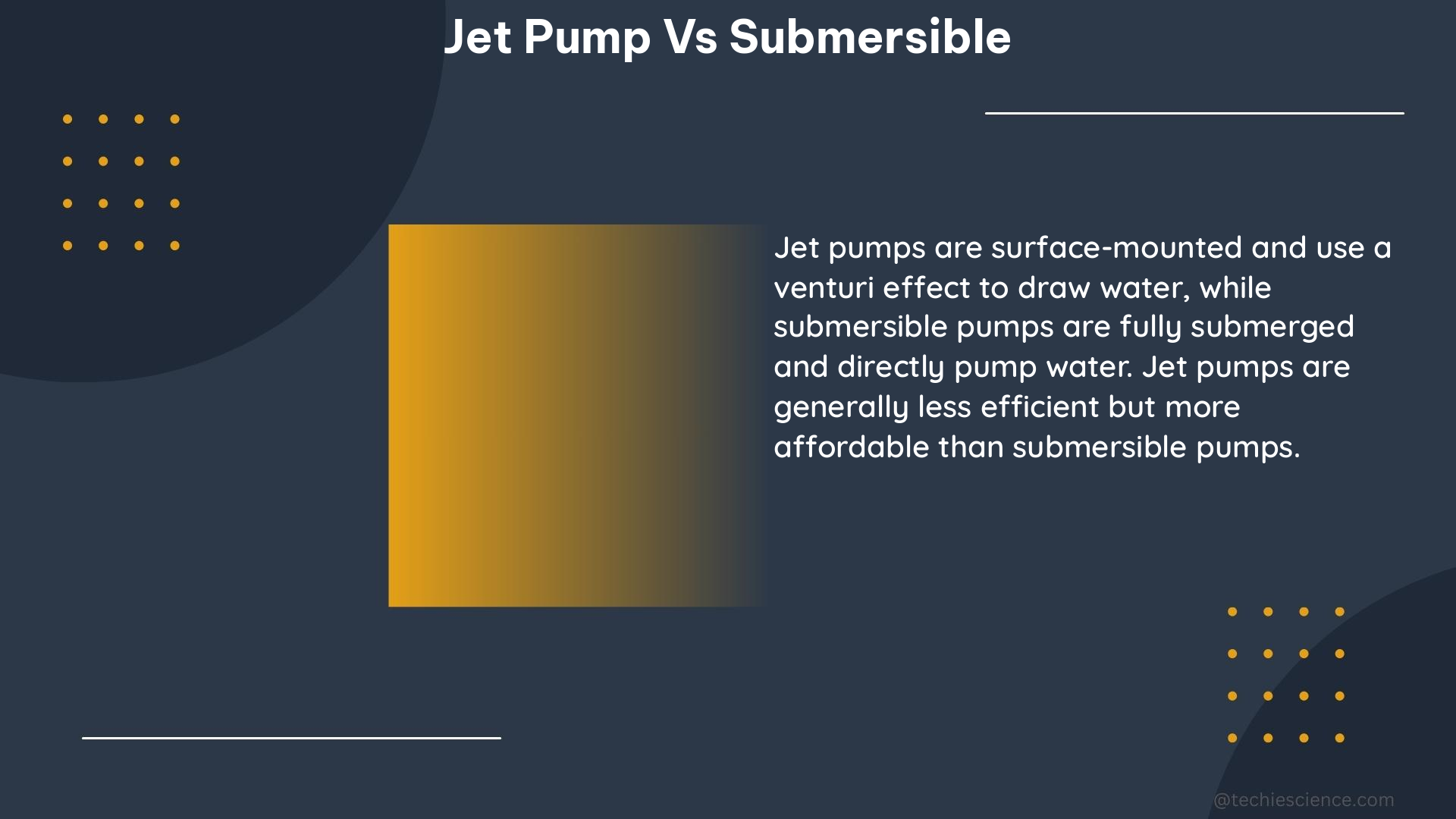When it comes to water well systems, the choice between a jet pump and a submersible pump can have a significant impact on the efficiency, cost, and overall performance of your setup. This comprehensive guide delves into the intricate details of these two pump types, providing you with a thorough understanding to make an informed decision.
Jet Pumps: Pros, Cons, and Technical Specifications
Jet pumps are a popular choice for many homeowners due to their relatively lower cost and ease of installation. However, their performance and capabilities are not to be underestimated.
Advantages of Jet Pumps
- Cost-Effective: Jet pumps typically range from $200 to $800, depending on the horsepower and features, making them a more budget-friendly option compared to submersible pumps.
- Lower Horsepower Requirement: Jet pumps require less horsepower to operate, which can translate to lower energy bills in the long run.
- Pressure Tank Integration: Jet pumps can be installed with a pressure tank, which helps regulate water pressure and reduces the need for frequent on/off cycling.
Limitations of Jet Pumps
- Suction Depth Limitation: Jet pumps have a maximum suction depth of around 25 feet, making them unsuitable for deeper wells.
- Lower Efficiency: Jet pumps are not as efficient as submersible pumps, with an efficiency range of 35% to 50%.
- Increased Maintenance: Jet pumps may require more maintenance over time compared to their submersible counterparts.
Technical Specifications of Jet Pumps
- Horsepower Range: Jet pumps are typically available in 1/2 HP to 2 HP sizes.
- Flow Rates: Jet pumps can handle flow rates ranging from 5 to 50 GPM (Gallons per Minute).
- Maximum Suction Depth: Jet pumps have a maximum suction depth of around 25 feet.
Submersible Pumps: Pros, Cons, and Technical Specifications

Submersible pumps, on the other hand, offer a more robust and efficient solution for water well systems, particularly for deeper wells.
Advantages of Submersible Pumps
- Efficiency: Submersible pumps have an efficiency range of 85% to 95%, making them significantly more efficient than jet pumps.
- Deeper Well Compatibility: Submersible pumps can be installed in wells up to 1,500 feet deep, allowing them to access water sources that are inaccessible to jet pumps.
- Longer Lifespan: Submersible pumps have a longer lifespan than jet pumps and generally require less maintenance over time.
- Quieter Operation: Submersible pumps are less noisy compared to jet pumps, providing a more peaceful environment.
- Higher Capacity: Submersible pumps often have a larger capacity, allowing them to handle higher volumes of water.
Limitations of Submersible Pumps
- Higher Cost: Submersible pumps are more expensive than jet pumps, with a cost range of $800 to $2,500, depending on the horsepower and features.
- Professional Installation: Submersible pumps require a professional to install and service due to their location within the well.
Technical Specifications of Submersible Pumps
- Horsepower Range: Submersible pumps are available in 1/2 HP to 10 HP sizes.
- Flow Rates: Submersible pumps can handle flow rates ranging from 5 to 1,000 GPM.
- Maximum Depth: Submersible pumps can be installed in wells up to 1,500 feet deep.
- Efficiency: Submersible pumps have an efficiency range of 85% to 95%.
Factors to Consider When Choosing Between Jet Pumps and Submersible Pumps
When deciding between a jet pump and a submersible pump, there are several key factors to consider:
- Well Depth: If your well is deeper than 25 feet, a submersible pump is the better choice as it can handle greater depths.
- Water Demand: Submersible pumps are better suited for higher water demand applications, as they can handle larger flow rates.
- Energy Efficiency: Submersible pumps are more energy-efficient, which can result in lower operating costs over time.
- Maintenance and Lifespan: Submersible pumps generally require less maintenance and have a longer lifespan compared to jet pumps.
- Budget: Jet pumps are the more budget-friendly option, while submersible pumps have a higher upfront cost.
Conclusion
In the end, the choice between a jet pump and a submersible pump will depend on your specific needs, budget, and the characteristics of your well. By understanding the pros, cons, and technical specifications of each pump type, you can make an informed decision that will ensure the optimal performance and longevity of your water well system.
References:
- Fine Homebuilding, “Jet Pump vs Submersable”, 2004-05-02, https://www.finehomebuilding.com/forum/jet-pump-vs-submersable
- Angi, “Water Well Jet Pump vs. Submersible Pump: Which Is Right for Your…”, 2023-11-22, https://www.angi.com/articles/jet-pump-vs-submersible.htm
- ScienceDirect, “Comparative analysis of an electrical submersible pump’s …”, S0920410519311684, https://www.sciencedirect.com/science/article/abs/pii/S0920410519311684
- Reddit, “Well pump: Jet vs submerged”, 2023-11-18, https://www.reddit.com/r/Plumbing/comments/17yg2cg/well_pump_jet_vs_submerged/
- Accurate Drilling Solutions, “Jet Pumps vs Submersible Pumps: Which One is Better for Your Well?”, 2023-07-02, https://accurate4.com/jet-pumps-vs-submersible-pumps-which-one-is-better-for-your-well/

The lambdageeks.com Core SME Team is a group of experienced subject matter experts from diverse scientific and technical fields including Physics, Chemistry, Technology,Electronics & Electrical Engineering, Automotive, Mechanical Engineering. Our team collaborates to create high-quality, well-researched articles on a wide range of science and technology topics for the lambdageeks.com website.
All Our Senior SME are having more than 7 Years of experience in the respective fields . They are either Working Industry Professionals or assocaited With different Universities. Refer Our Authors Page to get to know About our Core SMEs.